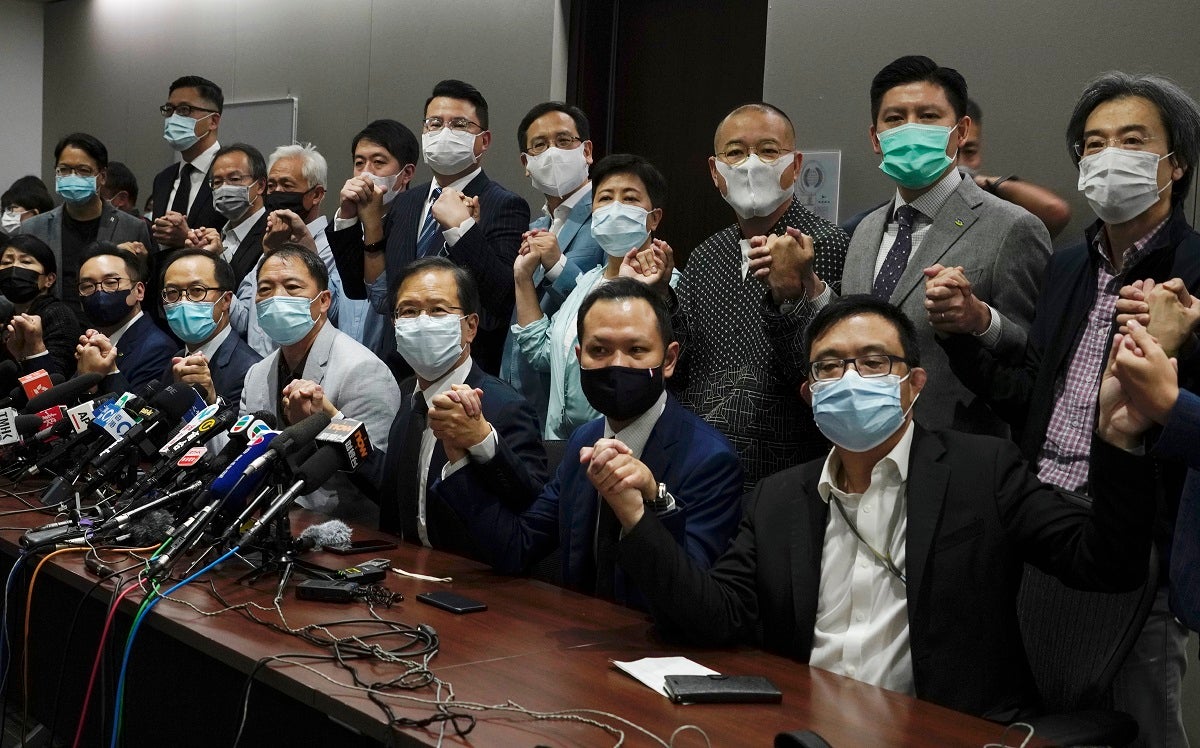China: Beijing Forces Out Hong Kong Opposition Lawmakers

(New York) – China’s top legislative body should reverse its decision effectively disqualifying four pro-democracy legislators in Hong Kong, triggering the resignation of 15 others, Human Rights Watch said today. Beijing’s action marked a watershed moment, giving the Hong Kong government arbitrary power to remove any legislator whose views it dislikes, turning the semi-democratic Legislative Council, or LegCo, into a rubber-stamp body. “Beijing finally has a legislature in Hong Kong with few members who will dare to challenge its policies,” said Maya Wang, senior China researcher. “The LegCo, once hoped to be a model for more democratic mainland governance, will soon become another Chinese parliament with no popular support and no transparency.” On November 11, 2020, China’s National People’s Congress Standing Committee (NPCSC) adopted a decision disqualifying Hong Kong legislators who “publicize or support independence,” “seek foreign interference,” or pursue “other activities that endanger national security.” Requiring adherence to these vague provisions contravenes the rule of law and violates the rights of legislators to freedom of expression and opinion. Following the NPCSC decision, the Hong Kong government immediately disqualified four pro-democracy legislators – Alvin Yeung, Dennis Kwok, Kwok Ka-ki, and Kenneth Leung. Fifteen other pro-democracy legislators in the LegCo said they will hand in their resignation letters on November 12. Although two pro-democracy legislators, Pierre Chan and Cheng Chung-tai, will stay, there will not be meaningful opposition in the LegCo as 39 of the remaining 41 legislators are pro-Beijing politicians, most of whom were not directly elected. With control both over Hong Kong’s executive and legislative branches, Beijing is rapidly moving toward its stated goal of “comprehensive governance” over the territory, a euphemism that signifies Beijing’s aim to quash popular movements for democracy and eradicate promised autonomy in Hong Kong.
The judiciary, which remains independent, is also under escalating pressure from Beijing. The government has disqualified pro-democracy advocates known for moderate views. Alvin Yeung, one of the four barred on November 11, was disqualified because he had signed a joint letter calling on the United States to pass the Hong Kong Human Rights and Democracy Act, while the other three were disqualified for vowing to veto all Hong Kong government policies as a means to exert pressure.
The Hong Kong Electoral Affairs Commission said these legislators “seek foreign interference” and “abuse power to force the government to accept their demands.” Even before Beijing’s decision, nearly half of the serving pro-democracy LegCo members also faced dubious criminal charges designed to harass them and block their political participation. In July, the Hong Kong government postponed by a year the LegCo elections originally slated for September – in which pro-democracy candidates were expected to make considerable gains – citing Covid-19 concerns even though the territory has effectively controlled the pandemic. It then sought the Chinese government to issue a decision concerning whether Alvin Yeung, Dennis Kwok, Kwok Ka-ki, and Kenneth Leung could continue to sit on the LegCo given that they had been disqualified from running in the postponed election. The NPCSC decision was purportedly issued in response to the Hong Kong Chief Executive’s request. Pro-democracy legislators said they resigned out of protest as they concluded that Beijing “can oust you using every means” if they consider a member “to be politically incorrect, unpatriotic or simply not likeable to look at.” Beijing’s decision followed a series of actions by the Beijing and Hong Kong governments since 2016 to gain full control over the LegCo by disqualifying pro-democracy activists from running for seats or unseating them after they were elected: The LegCo was established by the British colonial government and had been semi-democratic since 1985. It has been an essential, high-profile platform for legislators to air their views, galvanize public opinion, monitor the government, and hold officials accountable.
The removal of pro-democracy leaders from the LegCo not only weakens Hong Kong’s democracy movement. It will also mean that highly unpopular government policies – such as “Tomorrow Lantau,” which has significant environmental impact – are likely to pass with little opposition. Hong Kong’s chief executive, Carrie Lam, has ruled out by-elections in the near future due to Covid-19. She also said that having no opposition in the legislature is “nothing to be ashamed of,” and that she is “excited” that the government will be able to pass bills “more efficiently.” Concerned governments, including the United Kingdom, European Union countries, and the incoming Biden administration in the United States, should press for a United Nations special mandate holder to monitor and report on Hong Kong’s rights developments, Human Rights Watch said.
They should also establish a coordinated, international sanctions regime to hold officials accountable for violating the human rights of people in Hong Kong. Members of parliaments around the world should express solidarity with their Hong Kong counterparts. “Beijing is tearing down the last vestiges of its promise of democracy to the people in Hong Kong,” Wang said. “Now that Beijing has removed even the veneer of democratic rule and autonomy from Hong Kong, other governments should respond with concrete measures.” .
Read the full article at the original website
References:
- https://www.hrw.org/asia/china-and-tibet
- http://www.xinhuanet.com/politics/2020-11/11/c_1126725802.htm
- https://www.hrw.org/about/people/maya-wang
- https://www.info.gov.hk/gia/general/202011/11/P2020111100779.htm
- http://paper.wenweipo.com/2020/04/14/PL2004140003.htm
- https://www.france24.com/en/live-news/20201108-beijing-loyalists-target-hong-kong-judges-after-protester-acquittals
- https://news.mingpao.com/ins/%E6%B8%AF%E8%81%9E/article/20200731/s00001/1596165329902/%E7%AB%8B%E6%B3%95%E6%9C%83%E9%81%B8%E8%88%89-dq-%E6%A5%8A%E5%B2%B3%E6%A9%8B-%E7%AB%8B%E6%B3%95%E6%9C%83%E6%88%96%E4%B8%80%E6%AE%B5%E6%99%82%E9%96%93%E4%B8%8D%E5%86%8D%E6%9C%89%E5%85%AC%E6%B0%91%E9%BB%A8%E4%BB%A3%E8%A1%A8
- https://www.hrw.org/news/2020/04/20/hong-kong-crackdown-amid-covid-19
- https://hongkongfp.com/2020/11/11/breaking-all-hong-kong-democrats-quit-after-govt-ousts-4-lawmakers-leaving-legislature-with-no-effective-opposition/
- https://hongkongfp.com/2016/07/21/pan-democrat-legco-candidates-refuse-sign-new-declaration-stating-hong-kong-part-china/
- https://www.hrw.org/news/2016/11/04/hong-kong-china-interferes-judiciarys-independence
- https://www.theguardian.com/world/2017/jul/14/hong-kong-pro-democracy-legislators-disqualified-parliament
- https://www.hrw.org/news/2018/02/01/hong-kongs-great-leap-backward-political-rights
- https://hk.news.yahoo.com/%E6%9E%97%E9%84%AD%E6%9C%88%E5%A8%A5-%E4%B8%8D%E6%9C%83%E8%A8%88%E5%8A%83%E8%88%89%E8%A1%8C%E8%A3%9C%E9%81%B8-084643839.html
- https://www.theguardian.com/world/2020/nov/11/china-pro-democracy-hong-kong-lawmakers-opposition-oust
- https://www.hrw.org/news/2020/06/29/un-act-broad-expert-call-denouncing-china-abuses
